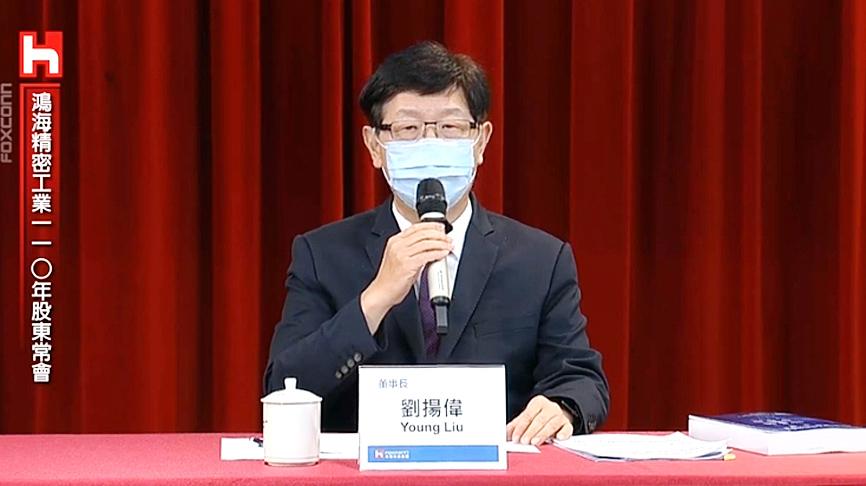Hon Hai Precision Industry Co (鴻海精密) yesterday said that its shareholders had approved a proposal to distribute a cash dividend of NT$4 per common share, the highest in 20 years.
The iPhone maker also said it was upbeat about its prospects for the second half of the year.
“The global parts supply shortage is of limited impact for us now,” Hon Hai chairman Young Liu (劉揚偉) said at the company’s annual general meeting in New Taipei City’s Tucheng District (土城). “I am optimistic about the rest of the year.”

Photo: screen grab from the Internet
The company expects minimal impact from the floods in China’s Zhengzhou City, where it has key production facilities, Liu added.
The Zhengzhou facilities in Henan Province supply the bulk of the company’s iPhone manufacturing capacity, but they have been spared from the floods, Hon Hai said.
“All our iPhone facilities remain fully functional,” although due to the severity of the floods, it has affected staff getting to and from work, the company said.
“Reports of a flooded Hon Hai facility is a small desktop component [operation] outside the main industrial park,” he added.
Liu also issued a statement touting Hon Hai’s efforts to grow its electric vehicle (EV) business, emphasizing the importance of forming a complete and collaborative supply chain with other companies through the MIH — Mobility in Harmony — alliance.
The alliance, which became an independent non-profit entity this month, now boasts 1,800 supply chain members and hopes to become “the Android of EVs” — an open standard to facilitate cooperation between suppliers.
Liu said that regional production is a “growing trend” and that it is inevitable that Hon Hai would create self-sufficient supply chains globally.
“We will take our experience of integrating vertically in China and working with various suppliers and replicate it all over the world,” Liu said.
Although Hon Hai is best known as the world’s largest contract electronics maker and a leading assembler of Apple products, Liu said he is looking forward to the EV business making a contribution.
“We will first see some results from key EV component sales, with whole vehicle sales starting from the fourth quarter of 2023,” Liu said.
“By 2025, we hope that 10 percent of EVs will contain some Hon Hai components,” he said.
Hon Hai’s EV line will start with electric buses, sedans and scooters, and the company will “continue to seek opportunities for collaboration around the world,” he said.

Semiconductor shares in China surged yesterday after Reuters reported the US had ordered chipmaking giant Taiwan Semiconductor Manufacturing Co (TSMC, 台積電) to halt shipments of advanced chips to Chinese customers, which investors believe could accelerate Beijing’s self-reliance efforts. TSMC yesterday started to suspend shipments of certain sophisticated chips to some Chinese clients after receiving a letter from the US Department of Commerce imposing export restrictions on those products, Reuters reported on Sunday, citing an unnamed source. The US imposed export restrictions on TSMC’s 7-nanometer or more advanced designs, Reuters reported. Investors figured that would encourage authorities to support China’s industry and bought shares

FLEXIBLE: Taiwan can develop its own ground station equipment, and has highly competitive manufacturers and suppliers with diversified production, the MOEA said The Ministry of Economic Affairs (MOEA) yesterday disputed reports that suppliers to US-based Space Exploration Technologies Corp (SpaceX) had been asked to move production out of Taiwan. Reuters had reported on Tuesday last week that Elon Musk-owned SpaceX had asked their manufacturers to produce outside of Taiwan given geopolitical risks and that at least one Taiwanese supplier had been pushed to relocate production to Vietnam. SpaceX’s requests place a renewed focus on the contentious relationship Musk has had with Taiwan, especially after he said last year that Taiwan is an “integral part” of China, sparking sharp criticism from Taiwanese authorities. The ministry said

CHANGING JAPAN: Nvidia-powered AI services over cellular networks ‘will result in an artificial intelligence grid that runs across Japan,’ Nvidia’s Jensen Huang said Softbank Group Corp would be the first to build a supercomputer with chips using Nvidia Corp’s new Blackwell design, a demonstration of the Japanese company’s ambitions to catch up on artificial intelligence (AI). The group’s telecom unit, Softbank Corp, plans to build Japan’s most powerful AI supercomputer to support local services, it said. That computer would be based on Nvidia’s DGX B200 product, which combines computer processors with so-called AI accelerator chips. A follow-up effort will feature Grace Blackwell, a more advanced version, the company said. The announcement indicates that Softbank Group, which until early 2019 owned 4.9 percent of Nvidia, has secured a

TECH SECURITY: The deal assures that ‘some of the most sought-after technology on the planet’ returns to the US, US Secretary of Commerce Gina Raimondo said The administration of US President Joe Biden finalized its CHIPS Act incentive awards for Taiwan Semiconductor Manufacturing Co (TSMC, 台積電), marking a major milestone for a program meant to bring semiconductor production back to US soil. TSMC would get US$6.6 billion in grants as part of the contract, the US Department of Commerce said in a statement yesterday. Though the amount was disclosed earlier this year as part of a preliminary agreement, the deal is now legally binding — making it the first major CHIPS Act award to reach this stage. The chipmaker, which is also taking up to US$5 billion